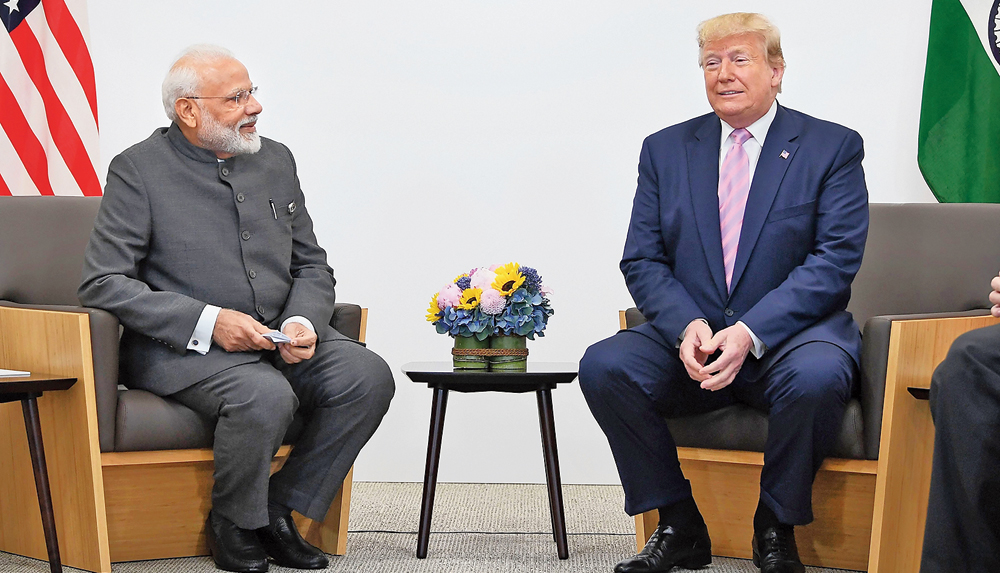US President Donald Trump on Tuesday launched a fresh attack on India for imposing tariffs on American products, days after his meeting with Prime Minister Narendra Modi in Osaka.
“India has long had a field day putting Tariffs on American products. No longer acceptable!” Trump tweeted.
But he did not indicate whether he would take any further action in the trade row between the two nations.
There was no immediate comment from India’s foreign and trade ministries.
Trump’s terse comment comes less than a fortnight after his meeting with Prime Minister Modi on the sidelines of the G20 Summit in Osaka on June 28, where the two leaders agreed their commerce ministers would meet to sort out the issues.
Later this week, US commerce secretary Wilbur Ross and energy secretary Rick Perry are scheduled to address an India-centric conference in Washington DC.
Before the meeting in Osaka with Modi, Trump had tweeted: “I look forward to speaking with Prime Minister Modi about the fact that India, for years having put very high Tariffs against the United States, just recently increased the Tariffs even further. This is unacceptable and the Tariffs must be withdrawn!”
He had also described India’s import tariff on the iconic Harley Davidson motorcycles as “unacceptable”, though he acknowledged that his “good friend” Modi slashed the duty by half from 100 per cent. Trump wants the duty reduced to zero.
The US and India are grappling with issues that include access to Indian markets for US firms, New Delhi’s demand for foreign firms to store Indian data in the country and Indian exports of steel and aluminium to the US market.
The trade row has prompted both countries to raise tariffs and created unease over the depth of their security alliance.
In February last year, India had slashed the duty on imported motorcycles like the Harley to 50 per cent after Trump threatened to impose a tariff on the import of Indian bikes to the US.
In March last year, the US imposed 25 per cent tariff on steel and a 10 per cent import duty on aluminium products from India.
In May this year, Trump scrapped India’s trade privileges under the Generalised System of Preferences (GSP), under which New Delhi could make duty-free exports worth up to $5.6 billion.
In response, New Delhi last month slapped higher tariffs on 28 US products, including almonds, pulses and walnuts.
Trump had terminated India’s designation as a beneficiary developing nation under the key GSP trade programme from June 5 after determining that New Delhi had not assured the US that it would provide “equitable and reasonable access” to its markets.
The GSP is the largest and oldest US trade preference programme and is designed to promote economic development by allowing duty-free entry for thousands of products from designated beneficiary countries.
Many US companies like Google, Mastercard, Visa and Amazon have raised concerns over the issue of data localisation and its impact on their operational costs.
The Reserve Bank of India had in April last year issued a directive on “Storage of Payment System Data”. It had advised all system providers to ensure that within six months, the entire data relating to payment systems operated by them is stored in a system only in India, for effective monitoring.
India has also dragged the US to the World Trade Organisation’s dispute settlement mechanism over the imposition of import duties on steel and aluminium.
India’s exports to the US in 2017-18 stood at $47.9 billion, while imports were at $26.7 billion. The trade balance is in favour of India.










